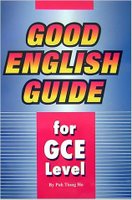
THE GOOD ENGLISH GUIDE
1. Everyone allows students of English to have occasional problems with the English
2. language. Native speakers, however, are expected to be immune to difficulties. This is
3. unfair. In hearing the language from birth, native speakers acquire all the mistakes and
4. misunderstandings made by their parents, friends and colleagues. Thankfully English is
5. versatile enough for these errors, not to matter too much. The language remains
6. intelligible and understandable even when it is full of mistakes. But it is no bad thing for
7. these “native” mistakes to be corrected and this is what the good word guide has send
8. out to. Martin Manser has listed the 2.000 words and expressions that are the most
9. frequently misused and provides a concise explanation of the reasons for the error and,
10. more importantly, what the correct usage is. It may come as a shock to some to realize
11. they have been speaking incorrectly for years, but now is as good a time as any to find
12. that out.
01. A alternativa correta de acordo com o texto é
a) Even native speakers need correction for their mistakes
b) Students of English make lots of mistakes.
c) English is an extremely difficult language to be learned.
d) To learn a language you need a very good dictionary
e) There are 2.000 words and expressions in English.
2. A forma passiva da frase “ everyone allows students of English to have problems” (linha 1) é “Students of English ..................to have problems”.
a) Were allowed
b) Have been allowed
c) Allow
d) Are allowed
e) Will be allowed
03. A palavra “however” (linha 2) pode ser substituída, sem alteração de sentido, por:
a) Therefore
b) Consequently
c) On the other hand
d) As a result of
e) Needless to say
04. The word “their” (line 4) refers to:
a) Native speakers
b) Difficulties
c) Mistakes and misunderstandings
d) Parents, friends and colleagues
e) Languages
HAVE FUN!!!
SEE YA ALL NEXT WEEK FOLKS!!!!!!!
PYTA



